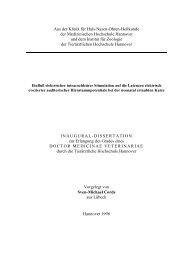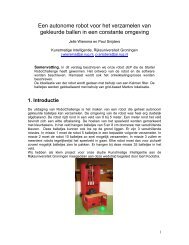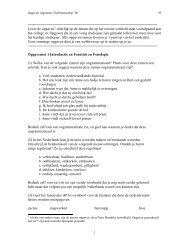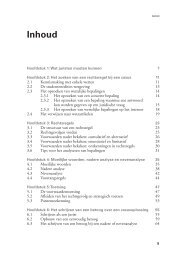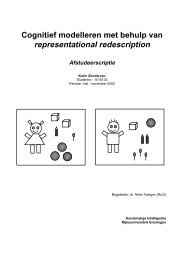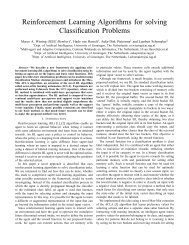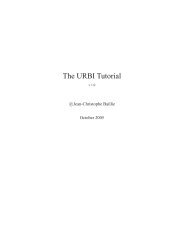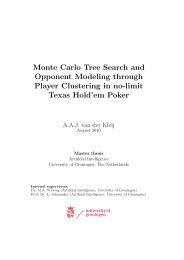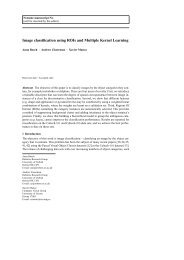Presuppositions in Spoken Discourse
Presuppositions in Spoken Discourse
Presuppositions in Spoken Discourse
Create successful ePaper yourself
Turn your PDF publications into a flip-book with our unique Google optimized e-Paper software.
Chapter 5<br />
In the case of aspectual verbs I th<strong>in</strong>k it is more correct to consider their<br />
presuppositions to be preconditions <strong>in</strong> a way quite different from the factives and<br />
presupposed material triggered by other expressions. The hearer doesn’t have to<br />
agree with or believe a presupposed fact <strong>in</strong> order to understand that the subject<br />
noticed, regretted or knew it. But the hearer has to accept the truth of an aspectual<br />
presupposition to make any sense of the rest of the <strong>in</strong>formation associated with it,<br />
i.e. I have to accept that John used to smoke to make any sense of the <strong>in</strong>formation<br />
that he quit.<br />
Others have po<strong>in</strong>ted out that the presuppositions of aspectual verbs are<br />
somewhat different, and Zeevat (1992) argues that they could be classified like<br />
lexical triggers like bachelor, and that their presuppositions seem to be easier to<br />
describe <strong>in</strong> terms of satisfaction than the b<strong>in</strong>d<strong>in</strong>g theory. 21 They seem to be more<br />
of a sortal restriction on us<strong>in</strong>g the word with the assertional mean<strong>in</strong>g. Another way<br />
<strong>in</strong> which they differ is that it is nearly impossible to locally accommodate them <strong>in</strong><br />
the scope of negation unless you are deal<strong>in</strong>g with true denial. The reason for this is<br />
because deny<strong>in</strong>g the presupposition makes the asserted material un<strong>in</strong>formative as<br />
well. This is arguably quite different than other cases of local accommodation. They<br />
can however be locally accommodated under other types of embedd<strong>in</strong>gs. For<br />
example, when they are <strong>in</strong>duced by a trigger <strong>in</strong> a long hypothetical discussion,<br />
illustrated <strong>in</strong> the example below. This is another way <strong>in</strong> which negated contexts<br />
differ from other embedded contexts.<br />
(49) it is not work<strong>in</strong>g now with an Austrian University (LOCAL) (1-2@ 649)<br />
Speaker B when we’ve got a bit more [<strong>in</strong>f] <strong>in</strong>formation, [@] and if we’ve . seen a<br />
pattern that beg<strong>in</strong>s to work…[@m] with [@m] with an Austrian<br />
university .#|<br />
B and A are discuss<strong>in</strong>g sett<strong>in</strong>g up some k<strong>in</strong>d of program between their university<br />
and universities abroad. Up until l<strong>in</strong>e 650 they are discuss<strong>in</strong>g which Italian<br />
universities could be partners and l<strong>in</strong>e 651 cont<strong>in</strong>ues an unspecified sentence that<br />
“first with Italian universities and then when we’ve seen a pattern that beg<strong>in</strong>s to<br />
work” with and Austrian University. Here it is necessary to read a great deal of the<br />
previous context to understand that the pattern referred to is be<strong>in</strong>g developed <strong>in</strong><br />
Italian universities and “with an Austrian university” is not a clause <strong>in</strong> any way<br />
attached to the preced<strong>in</strong>g sentence.<br />
Why do the <strong>in</strong>duced presuppositions of aspectual verbs behave this way? It<br />
could have someth<strong>in</strong>g to do with the role that presupposed <strong>in</strong>formation associated<br />
with aspectual verbs has. These presuppositions are usually not new <strong>in</strong>formation<br />
that the speaker wants to present as a fact and have accepted, but relatively<br />
unimportant though necessary background <strong>in</strong>formation/pre-conditions for the<br />
ma<strong>in</strong> po<strong>in</strong>t, whether the asserted <strong>in</strong>formation is negated, conditional or<br />
hypothetical. This is also why aspectual verb presuppositions are generally rather<br />
bor<strong>in</strong>g and seldom controversial, e.g. someone used to do someth<strong>in</strong>g, someone<br />
21 Note however that Zeevat (1992) also places factives <strong>in</strong> this same category.<br />
146



